The TSN Ethernet chips market is estimated at USD 263.6 million in 2025 and projected to reach USD 1,300 million by 2035, growing at a CAGR of 17.3%. An assessment of seasonality or cyclicality detection reveals a consistently upward trajectory with no sharp troughs or irregular drops in revenue across the forecast period. From 2020 to 2025, revenue rises steadily from USD 118.7 million to USD 263.6 million, reflecting a smooth early adoption phase. This indicates that demand is driven by long-term structural forces such as industrial automation, automotive networking, and smart infrastructure, rather than cyclical consumer or seasonal variations.
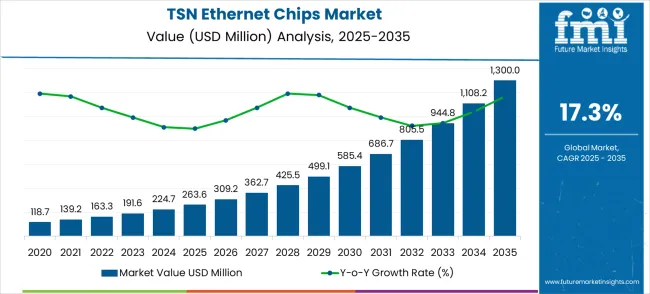
| Metric | Value |
|---|---|
| Estimated Value in (2025E) | USD 263.6 million |
| Forecast Value in (2035F) | USD 1,300 million |
| Forecast CAGR (2025 to 2035) | 17.3% |
Between 2025 and 2030, revenue grows from USD 263.6 million to USD 585.4 million, reflecting accelerated adoption but still without signs of seasonal fluctuations. The growth curve is consistent, with year-on-year increments strengthening predictably. This period coincides with the scaling of Industry 4.0 systems, automotive Ethernet deployment, and wider integration into telecommunications. The absence of cyclical dips suggests that purchasing and integration cycles are aligned with large industrial and technology investment strategies, which tend to follow long-term capex plans rather than seasonal or short-cycle consumer demand.
From 2030 to 2035, revenue expands further from USD 585.4 million to USD 1,300.0 million, underscoring the continuation of smooth and predictable growth. Even in this late phase, no signs of cyclicality or seasonal dependency appear in the market trajectory. Adoption is driven by steady expansion of connected vehicles, mission-critical communication, and advanced industrial systems, all of which are governed by regulatory compliance, technological standardization, and multi-year investment projects. The analysis shows that the TSN Ethernet chips market follows a non-seasonal, non-cyclical growth pattern, shaped by structural demand trends and long investment cycles rather than short-term market fluctuations.
Market expansion is being supported by the increasing complexity of industrial automation systems and the corresponding demand for reliable, deterministic communication networks. Modern manufacturing facilities are increasingly focused on networking solutions that can guarantee precise timing, low latency, and high reliability for mission-critical applications. The proven capability of TSN Ethernet chips to provide synchronized communication, bandwidth reservation, and traffic shaping makes them essential components of next-generation industrial networking infrastructure.
The growing emphasis on Industry 4.0 transformation and smart manufacturing initiatives is driving demand for advanced networking technologies that can support real-time data exchange and coordinated system operation. Industry preference for standardized networking solutions that can integrate with existing Ethernet infrastructure while providing enhanced deterministic capabilities is creating opportunities for TSN technology adoption. The rising influence of autonomous systems and robotics applications is also contributing to increased demand for ultra-reliable communication networks across different industrial sectors and applications.
The market is segmented by classification, application, and region. By classification, the market is divided into link speed below 2 Gbps, link speed 2-30 Gbps, link speed above 30 Gbps, and others. Based on application, the market is categorized into industrial automation, automobile, transportation, and others. Regionally, the market is divided into Asia Pacific, North America, Europe, Latin America, and Middle East & Africa.
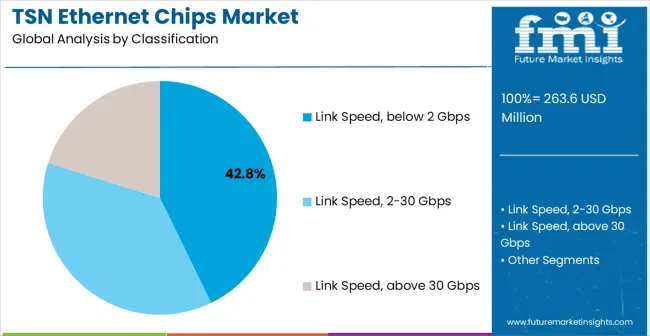
The link speed below 2 Gbps classification is projected to account for 42.8% of the TSN Ethernet chips market in 2025, reaffirming its position as the category's dominant technology segment. Industrial system integrators increasingly recognize the optimal balance of performance, cost-effectiveness, and power efficiency provided by lower-speed TSN implementations for many automation applications. This classification addresses the majority of current industrial networking requirements while providing essential time-sensitive networking capabilities.
This classification forms the foundation of most industrial TSN deployments, as it represents the most practical and widely applicable approach for existing automation infrastructure. Manufacturing adoption and system integration continue to strengthen confidence in lower-speed TSN implementations. With increasing recognition of the need for cost-effective deterministic networking solutions, link speeds below 2 Gbps align with both current deployment requirements and gradual migration strategies. Their broad compatibility across multiple applications ensures sustained market dominance, making them the central growth driver of TSN Ethernet chip adoption.
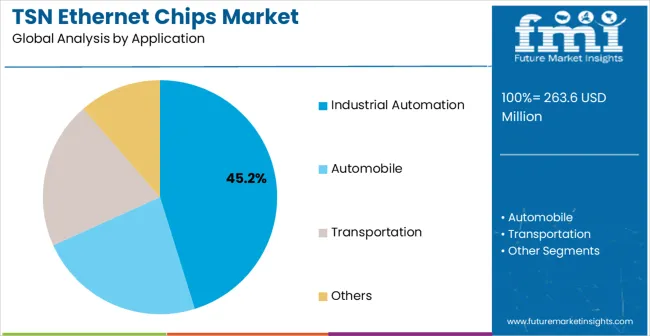
Industrial automation is projected to represent 45.2% of TSN Ethernet chips demand in 2025, underscoring its role as the primary application driving market development. Manufacturing companies recognize that industrial automation systems require the most sophisticated and reliable networking technologies to ensure coordinated operation and optimal performance. Industrial automation applications demand exceptional timing precision and deterministic behavior that TSN Ethernet chips are uniquely positioned to deliver.
The segment is supported by the continuous advancement of smart manufacturing initiatives requiring increasingly complex communication protocols and the growing deployment of industrial IoT systems across factory floors. Additionally, industrial automation is increasingly adopting converged networking approaches that can support both operational technology and information technology requirements. As understanding of industrial networking complexity advances, TSN applications will continue to serve as the primary commercial driver, reinforcing their essential position within the deterministic networking market.
The TSN Ethernet chips market is advancing rapidly due to increasing adoption of Industry 4.0 technologies and growing demand for deterministic networking solutions. However, the market faces challenges including complex protocol implementation, integration complexity with legacy systems, and requirements for specialized expertise. Innovation in chip design and network management software continue to influence product development and market expansion patterns.
The growing deployment of industrial IoT systems is enabling more sophisticated TSN implementations with enhanced connectivity and coordination capabilities. Advanced manufacturing platforms offer comprehensive integration capabilities, including edge computing and cloud connectivity, that are particularly important for modern industrial networking. Smart manufacturing systems provide access to real-time analytics and optimization tools that can leverage TSN deterministic capabilities.
Modern networking companies are incorporating AI-driven network management, predictive maintenance capabilities, and intelligent traffic optimization to enhance TSN Ethernet chip performance and reliability. These technologies improve network efficiency, enable proactive system monitoring, and provide enhanced coordination between networked devices. Advanced AI integration also enables optimized bandwidth allocation and improved fault detection characteristics.
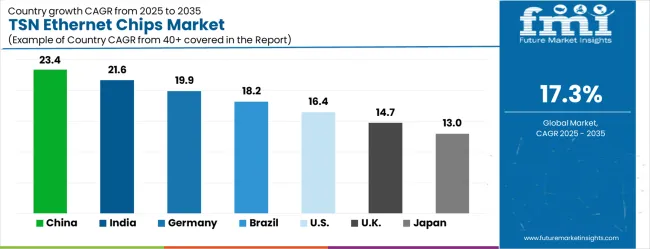
| Country | CAGR (2025-2035) |
|---|---|
| China | 23.4% |
| India | 21.6% |
| Germany | 19.9% |
| Brazil | 18.2% |
| USA | 16.4% |
| UK | 14.7% |
| Japan | 13.0% |
The TSN Ethernet chips market is experiencing exceptional growth globally, with China leading at a 23.4% CAGR through 2035, driven by massive industrial automation expansion, government support for smart manufacturing initiatives, and aggressive adoption of Industry 4.0 technologies. India follows at 21.6%, supported by rapidly growing manufacturing sector, increasing digitalization initiatives, and rising investment in industrial networking infrastructure. Germany shows growth at 19.9%, emphasizing precision manufacturing excellence and automotive industry transformation. Brazil records 18.2% growth, focusing on industrial modernization and manufacturing automation. The USA shows 16.4% growth, representing strong investment in advanced manufacturing technologies and industrial IoT deployment.
The report covers an in-depth analysis of 40+ countries top-performing countries are highlighted below.
TSN Ethernet chips market in China is projected to exhibit extraordinary growth with a CAGR of 23.4% through 2035, driven by unprecedented expansion in industrial automation capabilities and comprehensive government support for smart manufacturing transformation. The country's rapidly advancing manufacturing ecosystem and increasing capabilities in deterministic networking technologies are creating tremendous opportunities for TSN chip deployment. Major domestic and international semiconductor companies are establishing comprehensive research and production facilities to serve the massive industrial networking market.
TSN Ethernet chips market in India is expanding at a CAGR of 21.6%, supported by rapidly growing manufacturing sector, increasing industrial digitalization initiatives, and rising investment in advanced automation technologies. The country's expanding industrial base and commitment to smart manufacturing are driving demand for sophisticated networking solutions. International technology companies and domestic manufacturers are establishing partnerships to serve the growing demand for industrial networking infrastructure.
TSN Ethernet chips market in Germany is projected to grow at a CAGR of 19.9%, supported by the country's leadership in precision manufacturing and comprehensive expertise in industrial automation technologies. German manufacturers and automation companies consistently invest in cutting-edge networking technologies and deterministic communication systems. The market is characterized by advanced engineering capabilities, comprehensive industry collaboration, and established relationships between automation companies and networking technology developers.
TSN Ethernet chips market in Brazil is projected to grow at a CAGR of 18.2% through 2035, driven by industrial modernization initiatives, increasing manufacturing automation adoption, and growing focus on smart factory implementations. Brazilian manufacturers are increasingly adopting advanced networking technologies to support productivity improvements and quality enhancement requirements.
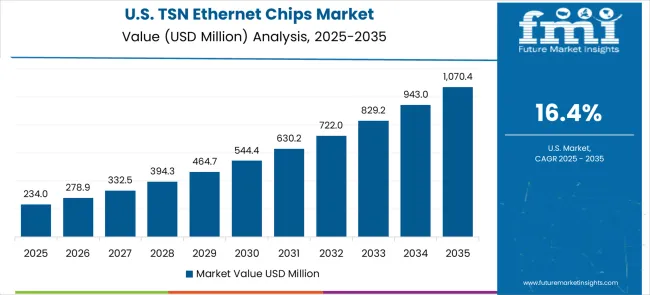
TSN Ethernet chips market in the USA is projected to grow at a CAGR of 16.4%, supported by substantial investment in advanced manufacturing technologies, comprehensive research and development programs, and leadership in industrial IoT deployment. American technology companies and manufacturers consistently advance TSN technologies through comprehensive innovation programs and industry collaboration.
TSN Ethernet chips market in the UK is projected to grow at a CAGR of 14.7% through 2035, supported by industrial technology innovation initiatives and increasing investment in advanced manufacturing capabilities. British technology companies and research institutions emphasize development of next-generation networking solutions within integrated Industry 4.0 frameworks that prioritize performance optimization and system reliability.
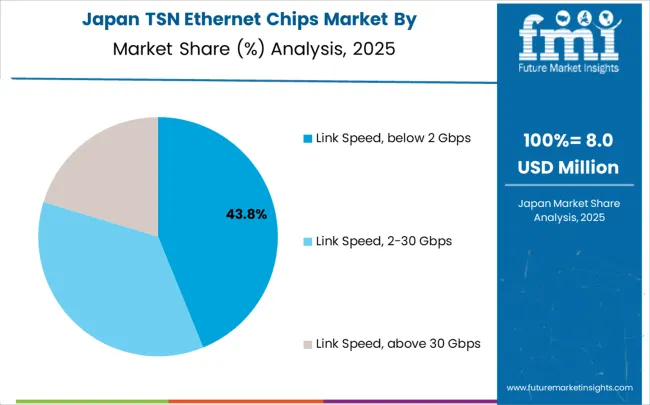
TSN Ethernet chips market in Japan is projected to grow at a CAGR of 13% through 2035, supported by the country's leadership in precision engineering and comprehensive approach to advanced manufacturing technologies. Japanese technology companies and manufacturers emphasize innovation-driven development of sophisticated networking systems within established frameworks that prioritize technical excellence and manufacturing precision.
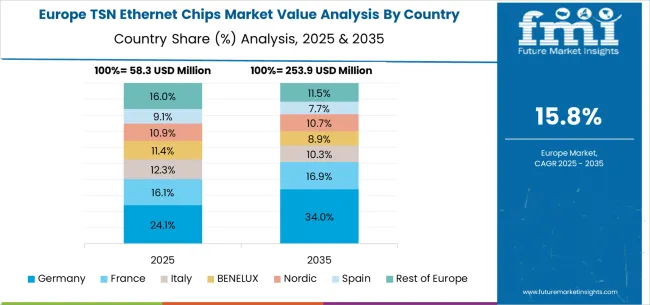
The TSN Ethernet chips market in Europe is projected to expand rapidly through 2035, supported by increasing adoption of Industry 4.0 technologies, rising investment in industrial automation, and ongoing innovation in deterministic networking solutions. Germany will continue to lead the regional market, accounting for 29.7% in 2025 and rising to 31.2% by 2035, supported by strong automotive industry integration, advanced manufacturing capabilities, and comprehensive research and development infrastructure. The United Kingdom follows with 19.8% in 2025, increasing to 20.4% by 2035, driven by industrial technology innovation initiatives, government support for advanced manufacturing, and expanding research collaboration networks.
France holds 16.4% in 2025, edging up to 16.9% by 2035 as manufacturers expand automation capabilities and demand grows for deterministic networking solutions. Italy contributes 13.1% in 2025, remaining stable at 13.3% by 2035, supported by industrial modernization programs and growing adoption of advanced networking technologies. Spain represents 9.6% in 2025, moving upward to 9.8% by 2035, underpinned by expanding manufacturing automation and increasing investment in smart factory technologies.
Nordic countries together account for 6.8% in 2025, maintaining their position at 6.9% by 2035, supported by advanced industrial initiatives and early adoption of innovative networking solutions. The Rest of Europe represents 4.6% in 2025, declining slightly to 1.5% by 2035, as larger markets capture greater investment focus and technology development resources.
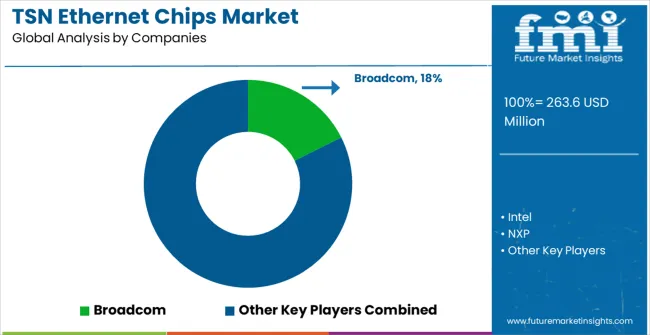
The TSN Ethernet chips market is characterized by competition among established semiconductor companies, specialized networking technology firms, and innovative chip design companies. Companies are investing in advanced protocol implementation, silicon optimization, strategic partnerships, and market development to deliver high-performance, reliable, and cost-effective TSN solutions. Technology development, standards compliance, and ecosystem building strategies are central to strengthening competitive advantages and market presence.
Broadcom leads the market with significant expertise in networking semiconductor development, offering comprehensive TSN Ethernet chip solutions with focus on performance optimization and broad market coverage. Intel provides advanced processor and networking technologies with emphasis on industrial and automotive applications. NXP focuses on automotive and industrial semiconductor solutions with comprehensive TSN implementation capabilities. ADI delivers precision analog and mixed-signal technologies with strong focus on industrial networking applications.
TI operates with focus on embedded processing and analog technologies for industrial automation systems. Renesas Electronics provides comprehensive semiconductor solutions with emphasis on automotive and industrial markets. Kyland Technology specializes in industrial networking equipment and TSN implementation. Kungao Micro focuses on domestic semiconductor development with industrial networking capabilities. Suzhou TSN Technology, Motorcomm, Beijing Guoke Tianxun Technology, and Beijing Semidrive Technology provide diverse technological approaches and regional market access strategies to enhance overall market development and technology advancement.
| Items | Values |
|---|---|
| Quantitative Units (2025) | USD 263.6 million |
| Classification | Link Speed below 2 Gbps, Link Speed 2-30 Gbps, Link Speed above 30 Gbps, Others |
| Application | Industrial Automation, Automobile, Transportation, Others |
| Regions Covered | Asia Pacific, North America, Europe, Latin America, Middle East & Africa |
| Countries Covered | China, India, Germany, Brazil, United States, United Kingdom, Japan and 40+ countries |
| Key Companies Profiled | Broadcom, Intel, NXP, ADI, TI, Renesas Electronics, Kyland Technology, Kungao Micro, Suzhou TSN Technology, Motorcomm, Beijing Guoke Tianxun Technology, Beijing Semidrive Technology |
| Additional Attributes | Dollar sales by chip type and application, regional technology adoption trends, competitive landscape, industrial partnerships and collaborations, integration with automation systems, innovations in TSN protocol implementation, manufacturing scalability analysis, and network performance optimization strategies |
The global TSN ethernet chips market is estimated to be valued at USD 263.6 million in 2025.
The market size for the TSN ethernet chips market is projected to reach USD 1,300.0 million by 2035.
The TSN ethernet chips market is expected to grow at a 17.3% CAGR between 2025 and 2035.
The key product types in TSN ethernet chips market are link speed, below 2 gbps, link speed, 2-30 gbps and link speed, above 30 gbps.
In terms of application, industrial automation segment to command 45.2% share in the TSN ethernet chips market in 2025.






Our Research Products

The "Full Research Suite" delivers actionable market intel, deep dives on markets or technologies, so clients act faster, cut risk, and unlock growth.

The Leaderboard benchmarks and ranks top vendors, classifying them as Established Leaders, Leading Challengers, or Disruptors & Challengers.

Locates where complements amplify value and substitutes erode it, forecasting net impact by horizon

We deliver granular, decision-grade intel: market sizing, 5-year forecasts, pricing, adoption, usage, revenue, and operational KPIs—plus competitor tracking, regulation, and value chains—across 60 countries broadly.

Spot the shifts before they hit your P&L. We track inflection points, adoption curves, pricing moves, and ecosystem plays to show where demand is heading, why it is changing, and what to do next across high-growth markets and disruptive tech

Real-time reads of user behavior. We track shifting priorities, perceptions of today’s and next-gen services, and provider experience, then pace how fast tech moves from trial to adoption, blending buyer, consumer, and channel inputs with social signals (#WhySwitch, #UX).

Partner with our analyst team to build a custom report designed around your business priorities. From analysing market trends to assessing competitors or crafting bespoke datasets, we tailor insights to your needs.
Supplier Intelligence
Discovery & Profiling
Capacity & Footprint
Performance & Risk
Compliance & Governance
Commercial Readiness
Who Supplies Whom
Scorecards & Shortlists
Playbooks & Docs
Category Intelligence
Definition & Scope
Demand & Use Cases
Cost Drivers
Market Structure
Supply Chain Map
Trade & Policy
Operating Norms
Deliverables
Buyer Intelligence
Account Basics
Spend & Scope
Procurement Model
Vendor Requirements
Terms & Policies
Entry Strategy
Pain Points & Triggers
Outputs
Pricing Analysis
Benchmarks
Trends
Should-Cost
Indexation
Landed Cost
Commercial Terms
Deliverables
Brand Analysis
Positioning & Value Prop
Share & Presence
Customer Evidence
Go-to-Market
Digital & Reputation
Compliance & Trust
KPIs & Gaps
Outputs
Full Research Suite comprises of:
Market outlook & trends analysis
Interviews & case studies
Strategic recommendations
Vendor profiles & capabilities analysis
5-year forecasts
8 regions and 60+ country-level data splits
Market segment data splits
12 months of continuous data updates
DELIVERED AS:
PDF EXCEL ONLINE
Time Sensitive Networking TSN Market Size and Share Forecast Outlook 2025 to 2035
Ethernet Connector and Transformer Market Size and Share Forecast Outlook 2025 to 2035
Ethernet Storage Fabric Market Size and Share Forecast Outlook 2025 to 2035
Ethernet Storage Market Size and Share Forecast Outlook 2025 to 2035
Ethernet Backhaul Equipment Market Size and Share Forecast Outlook 2025 to 2035
Ethernet Access Device Market Size and Share Forecast Outlook 2025 to 2035
Ethernet Switch Market
Power Over Ethernet (PoE) Controllers Market Size and Share Forecast Outlook 2025 to 2035
Industrial Ethernet Market Size and Share Forecast Outlook 2025 to 2035
Power Over Ethernet (PoE) Solutions Market Size and Share Forecast Outlook 2025 to 2035
PoE Solutions Market - Growth, Demand & Forecast 2025 to 2035
In-Vehicle Ethernet System Market Growth – Trends & Forecast 2025 to 2035
SP Routing And Ethernet Switching Market Size and Share Forecast Outlook 2025 to 2035
Biochips Market Size and Share Forecast Outlook 2025 to 2035
5G Chipset Market Analysis - Growth & Forecast through 2034
Wi-Fi Chipset Market Growth - Trends & Forecast 2025 to 2035
Lab-On-Chips Market Size and Share Forecast Outlook 2025 to 2035
Veggie Chips Market Growth - Consumer Trends & Flavor Innovations 2025 to 2035
Mobile Chipset Market Analysis by Clock Speed, Frequency Type, Processing Node Type, End-User & Region from 2025 to 2035
Cloud AI Chipsets Market

Thank you!
You will receive an email from our Business Development Manager. Please be sure to check your SPAM/JUNK folder too.
Chat With
MaRIA